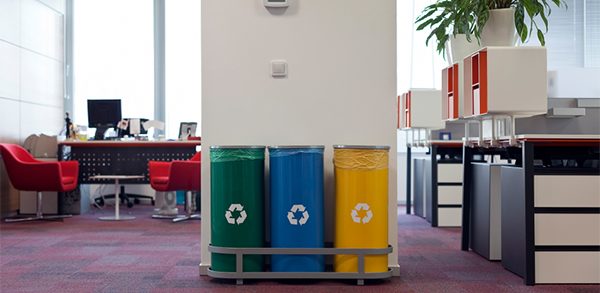
By Veena Clay May 16, 2014
Recycling at the office by now is nothing new. Still, there is much room for progress. Your company may be one that has yet to start an electronic recycling program, but it is hard to imagine there is not at least some interest and support just waiting to be solicited. The key to getting your company involved in electronic recycling is approaching the initiative wisely and preparing purposeful solutions for snags that may arise as the program develops.
A word on EPA standards
Since electronics contain a number of hazardous materials, one of the main reasons to recycle them is to prevent these materials from adversely affecting the environment after disposal. That means most businesses must consider federal and state guidelines when developing an electronics recycling program.
These guidelines ensure that companies properly dispose of electronic equipment, keeping them out of landfills and reducing the overall electronics waste stream. The EPA provides helpful information about recycling electronics and the mandates and regulations governing proper disposal. Also, some states have enacted electronics recycling program laws that workers should be aware of before starting an in-office recycling program.
Why recycle electronics at work?
There are several excellent reasons to consider recycling electronics at work. First, in some cases, there are economic incentives. Recycling electronics can be a big money saver since it can reduce the cost of disposal pickups. Also, several companies such as Staples, Office Depot and Best Buy have takeback or buy-back programs that could mean actual dollars in your company’s pocket.
It should also be noted that recycling generally motivates workers in a positive way. Workers generally feel assured that their company is involved in a cause that has significant impact on global issues, boosting morale and increasing worker loyalty in the process. It could even be a great way to attract valuable new workers who are on the lookout for companies with a sincere commitment to reducing negative impact on the environment.
Here are a few ways to get things started:
1. Garner support
A company-wide electronic recycling program is better off with a broad range of support from more than just one worker. If there are co-workers that you know have an inclination toward recycling and sustainability, reach out. Garnering support from like-minded and interested colleagues gives the initiative a more credible image. This can be important when approaching management and supervisors about the idea.
2. Converse with management
Conversing with management about a company electronic recycling program is the first step in formally solidifying a workable program. You will want to go in with a reasonable proposal, or at least a good outline that will provide a fitting foundation and can help generate positive dialogue about the details of an electronics recycling program. Approaching management in the right way at the right time can establish sufficient rapport for sustaining the program for years to come.
3. Appoint a facilitator
Any great initiative needs a facilitator. This person need not take on the full responsibility of the entire program. Rather, the purpose of the role should be to ensure that participants have a central point of contact as well as someone who can ensure accountability and enable periodic reports about the program’s progress. The role of facilitator is key to establishing a sound structure for the program so that it will ultimately remain successful even as the company grows and evolves.
4. Start small
While there are likely a vast number of devices within any one company that could provide substance for an elaborate electronic recycling program, it may be a smarter idea to start small. Workers may at first feel overwhelmed with a long list of recycling mandates, so starting with a small list of one or two items that can be conveniently collected could actually motivate a larger amount of participation at the program’s outset. This can be crucial to creating a program that will last.
5. Keep it going
Nothing is more disappointing than a much-heralded initiative that dwindles and dissipates as times goes on. Starting an electronic recycling program in your company means building a program that will last and continue to have a strong impact for years to come. Doing so means thinking ahead while the initiative is still in the planning phase. Consider developing a five-year plan for the program and generating a timeline that sets realistic milestones and goals for future sustainability.
Where to turn for help
Before getting an electronic recycling initiative started at work, it is always good to use your resources. Many communities and metropolitan areas offer consultants and nonprofit organizations available to assist other businesses with developing recycling programs at work. For instance, the Recycling at Work group offers a 10-step action plan customizable for businesses large and small, as well as tools for implementation.
Cities, counties and other public entities may also be able to offer assistance. For example, in Hamilton County, OH, businesses can get help with electronics recycling through the Recycling at Work program. The program helps participating businesses develop a recycling plan and provides free recycling bins for convenient desk-side collection.
Whether you choose to get assistance and advice from a consultant, nonprofit or public entity, be sure to tailor the information provided to your company’s particular recycling needs and goals. Check your local listings to find the assistance program that is right for your company.
Getting your company involved in electronics recycling
Getting your company involved in electronics recycling is a great way to make a positive contribution in response to the global electronic waste crisis. All over the world, businesses and individuals are waking up to the detrimental effects of a mounting electronics waste stream that threatens the sustainability of our planet and causes harm to the health and well being of communities around the world. Taking that time to do your part, even at the office, can make a world of difference.